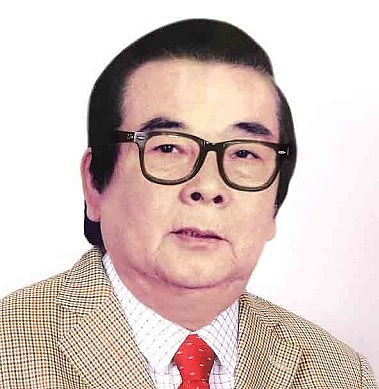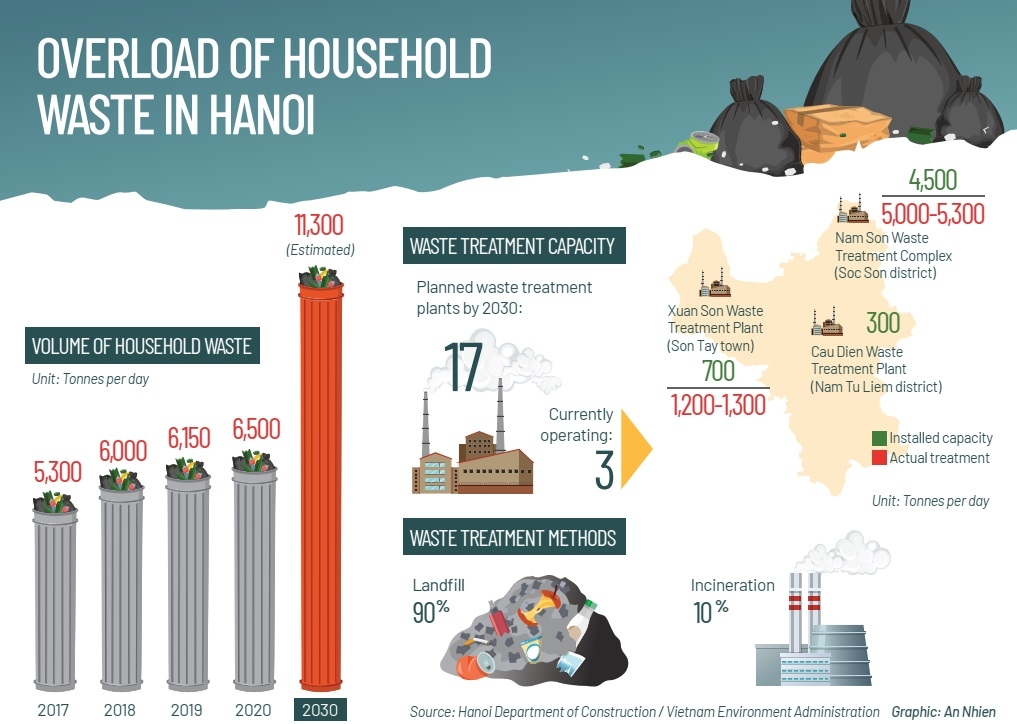Strong answers being sought for city waste
What are the possible solutions Vietnam’s urban areas can apply to treat waste?
 |
| Le Lien, representative of Canadian group Naanovo Energy Inc |
Currently the most popular waste treatment method in Vietnam is to collect then bury urban waste. Waste burial is simple to carry out and low-cost to invest but it causes various side effects to our environment.
The prolonged decomposing time, untreated persistent waste, and harmful emissions concentrating into an area causes heavy pollution to both surface and underground water sources as well as soil in large-scale surroundings of waste landfills. It also seriously impacts the health and living conditions of the local people.
Besides waste burial, some rural regions in Vietnam use biogas solutions to treat waste in order to collect energy. This method can classify waste to recycle into iron, paper, plastic, and glass.
Meanwhile, organic garbage is collected and fertilised in concrete tanks for generating energy. In other regions of Vietnam, organic waste is also composted to produce bio-fertiliser to lower chemical consumption in the farming process. But this method causes a bad smell and dirty wastewater.
There are a vast number of high-tech solutions for waste treatment applied worldwide. Which ones could be most suitable for Vietnam?
Some of most popular technologies are the BIOmaax and BIOmaax Combuster solutions. While BIO Maax composes organic waste to collect natural or methane gas for generating energy, the BIOmaax Combuster technology converts organic waste to steam energy. They both use organic waste as feedstock to convert the clean-energy and organic compost production process.
However, the most advanced technology now is to produce electricity from municipal solid waste (MSW) without any negative effects to the environment. This waste-to-energy (WTE) technology is provided by Naanovo and we think it is the best choice for Vietnam.
With the continuous increase of the urban population in Vietnam’s cities, it’s essential to apply advanced technologies and solutions to thoroughly treat all types of waste to prevent air, water, and soil pollution as well as to offload current landfill sites.
 |
What are the outstanding features of Naanovo’s WTE solutions in terms of technology and equipment?
Naanovo’s proprietary WTE/Maax™, which applies modern technology to burn urban waste completely to generate energy, has been developed and carried out successfully in Sweden. This unique design takes advantage of the best WTE technologies and maximises the amount of power output that can be produced in the combustion of large volumes of MSW.
In addition to large quantities of electricity, other valuable commodities can be produced in the process, such as potable water and cinderblocks. Each WTE/Maax™ module combusts 180 metric tons of MSW per day at a temperature exceeding 1,000°C, without the need for additional fuels, and produces a minimum generating capacity of 6-7MW of electricity per hour. Each module incorporates the best available technology to ensure the highest standard of performance and the least possible impact on the environment.
What obstacles have you encountered when trying to operate in Vietnam, and what are the main tactics to overcome them?
It is hard to deny the practical values of WTE solutions in Vietnam, so Naanovo believes that we will be able to gain success in building and operating around the country if the government and related authorities offer more support. We are ready to invest in these projects in Vietnam but we need that supports, especially for administrative procedures and incentives that provincial authorities are advertising in order to roll out the red carpet to welcome investors.
In Hanoi, I see overloaded landfill sites without an effective treatment solution. The overloaded sites are causing serious air, water, and soil pollution and damaging the health of citizens. Hanoi should enforce stricter punishments to organisations and entrepreneurs who create wrongdoing in waste collecting and treating, as well as apply more effective methods to prevent air pollution for locals surrounding waste landfill sites in the first place.
The capital plays a very important part in the cultural, political, diplomatic, and economic performance of the country on the international stage, and so it is urgent for us to work together to maintain a healthy, clean, and green environment for the capital.
What the stars mean:
★ Poor ★ ★ Promising ★★★ Good ★★★★ Very good ★★★★★ Exceptional
Related Contents
Latest News
More News
- Hermes joins Long Thanh cargo terminal development (February 04, 2026 | 15:59)
- SCG enhances production and distribution in Vietnam (February 04, 2026 | 08:00)
- UNIVACCO strengthens Asia expansion with Vietnam facility (February 03, 2026 | 08:00)
- Cai Mep Ha Port project wins approval with $1.95bn investment (February 02, 2026 | 16:17)
- Repositioning Vietnam in Asia’s manufacturing race (February 02, 2026 | 16:00)
- Manufacturing growth remains solid in early 2026 (February 02, 2026 | 15:28)
- Navigating venture capital trends across the continent (February 02, 2026 | 14:00)
- Motivations to achieve high growth (February 02, 2026 | 11:00)
- Capacity and regulations among British areas of expertise in IFCs (February 02, 2026 | 09:09)
- Transition underway in German investment across Vietnam (February 02, 2026 | 08:00)

 Tag:
Tag:




















 Mobile Version
Mobile Version